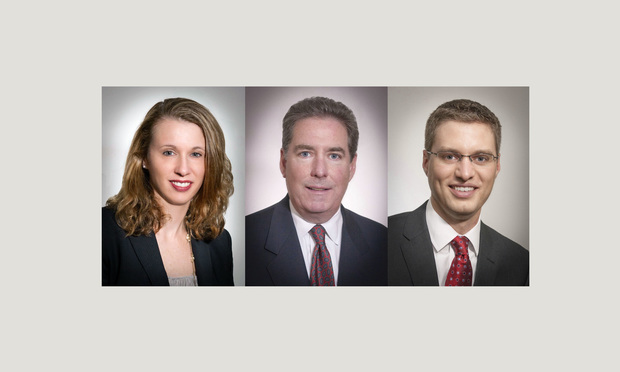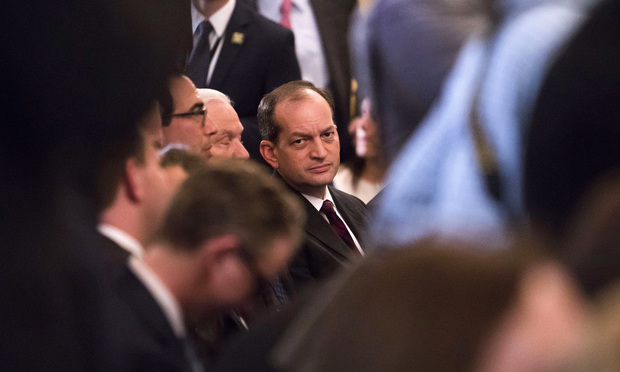Andrea M. Kirshenbaum

July 27, 2020 | The Legal Intelligencer
Avoiding Wage-and-Hour Woes During the COVID-19 PandemicNow that employers have their remote work programs up and running and as some employees have begun to return to the physical workplace, it makes sense to assess potential wage-and-hour pitfalls and ensure that additional practices have been put in place to mitigate against the risk of wage-and-hour claims
By Andrea M. Kirshenbaum
6 minute read

March 30, 2020 | The Legal Intelligencer
The Families First Coronavirus Response Act: What Employers Need to KnowThe act, which is set to take effect on April 1, provides paid FMLA leave and paid sick leave to employees of certain employers who meet specific criteria.
By Andrea M. Kirshenbaum, James R. Malone Jr. and David E. Renner
14 minute read

October 28, 2019 | The Legal Intelligencer
'Tis the Season for Overtime Regulations for Both the DOL and L&IThe DOL estimates that its final rule, which will become effective Jan. 1, 2020, will extend overtime pay eligibility to 1.3 million workers. The salary threshold in the final rule is nearly identical to the $679 per week proposed earlier this year by the DOL.
By Andrea M. Kirshenbaum
8 minute read

July 26, 2019 | The Legal Intelligencer
New EEO-1 Pay Data Reporting Requirements: What Employers Need to KnowAll private employers employing 100 or more employees and subject to Title VII must submit an EEO-1 report annually.
By Andrea M. Kirshenbaum and David E. Renner
7 minute read

March 21, 2019 | The Legal Intelligencer
U.S. Department of Labor Proposes New Overtime Rule ... AgainAfter much anticipation, on March 7, the U.S. Department of Labor (DOL) issued its notice of proposed rulemaking, proposing to update, among other things, the Fair Labor Standards Act's (FLSA) salary level for the executive, administrative, professional, outside sales and computer exempt employees from $455 to $679 per week.
By Andrea M. Kirshenbaum and Kayleen Egan
8 minute read

October 29, 2018 | The Legal Intelligencer
Joint Employment, Compliance and Overtime: A Wage-and-Hour UpdateAs Secretary Alexander Acosta has settled into his position at the U.S. Department of Labor (DOL), employers are seeing several new compliance initiatives.
By Andrea M. Kirshenbaum and Kayleen Egan
7 minute read

June 29, 2018 | The Legal Intelligencer
Pa. Proposes Significant Increase to Overtime Salary ThresholdsIn response to Gov. Tom Wolf's call to “modernize” Pennsylvania's overtime rules, on June 23, 2018 the Pennsylvania Department of Labor and Industry (L&I) proposed rulemaking to update the decades-old regulations applicable to three classes of overtime exempt employees under the Pennsylvania Minimum Wage Act (PMWA): executive, administrative, and professional (EAP).
By Andrea M. Kirshenbaum and Benjamin S. Teris
6 minute read

March 30, 2018 | The Legal Intelligencer
Amendment to the FLSA: The Tip Income Protection Act of 2018Restaurants and hotels increasingly have found themselves over the last several years as defendants in lawsuits or the subject of investigation by the DOL's Wage and Hour Division challenging their “tip pooling” practices.
By Andrea M. Kirshenbaum
6 minute read

September 29, 2017 | Corporate Counsel
Court Defines 'Willfulness' Under FLSA and OKs Reduced Fee AwardOn Sept. 20, the U.S. Court of Appeals for the Third Circuit issued a precedential opinion in Souryavong v. Lackawanna County that is music…
By Andrea M. Kirshenbaum
6 minute read
September 29, 2017 | The Legal Intelligencer
Court Defines 'Willfulness' Under FLSA and OKs Reduced Fee AwardOn Sept. 20, the U.S. Court of Appeals for the Third Circuit issued a precedential opinion in Souryavong v. Lackawanna County that is music to the ears of employers on two fronts. First, the court of appeals defined a willful violation under the Fair Labor Standards Act (FLSA) narrowly, requiring actual awareness of the specific FLSA violation and a degree of egregiousness. Second, the Third Circuit affirmed the district court's attorney fees award, applying a hybrid lodestar and multi-factor test analysis, resulting in an award to the plaintiffs' counsel of approximately one-third of what the plaintiffs originally sought.
By Andrea M. Kirshenbaum
6 minute read
Trending Stories
More from ALM
- Scan In Progress: Litigators Leverage AI to Screen Prospective Jurors 1 minute read
- Legal Speak at General Counsel Conference East 2024: Match Group's Katie Dugan & Herrick's Carol Goodman 1 minute read
- Legal Speak at General Counsel Conference East 2024: Eric Wall, Executive VP, Syllo 1 minute read



